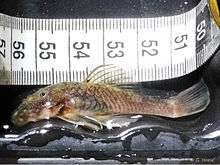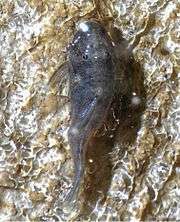Chaetostoma microps
Chaetostoma microps is a species of suckermouth armored catfish native to Ecuador. The fish has been filmed climbing cave walls.[1]
| Chaetostoma microps | |
|---|---|
 | |
| Scientific classification | |
| Kingdom: | Animalia |
| Phylum: | Chordata |
| Class: | Actinopterygii |
| Order: | Siluriformes |
| Family: | Loricariidae |
| Genus: | Chaetostoma |
| Species: | C. microps |
| Binomial name | |
| Chaetostoma microps Günther, 1864 | |
Discovery
The species was first described by Albert Günther in 1864. The type specimen is from the "Andes of western Ecuador".[2]
Description

C. microps has the following characteristics :[2]
- absence of plates (external flattened armoured structures) on the ventral region
- absence of plates on the edge of the catfish snout
- presence of interopercular odontodes (barbs behind the gill covers), a characteristic shared with another species - C. platyrhynchus
- absence of fleshy tentacles on the snout, differentiating this genus from Ancistrus spp.
C. microps has a few sexually dimorphic characteristics, namely the head of females is smaller and narrower than that of males, while broader ventrally; in addition, the pelvic fins of the male are much larger, evidently so that, when inverted over a cluster of fish-eggs, they can protect sperm from being carried away in the current and thus aid fertilisation.[2] The fish is 8.9 centimetres (3.5 in) long.[3]
Natural history
C. microps, which has previously been recorded in rivers originating from the Andes mountains, clings to rocks. The fish are primarily algae-feeders.[4]
Recently, the fish was recorded underground from limestone caves containing streams, near Tena, Napo Province, Ecuador. The fish was observed and filmed climbing the cave wall reaching up to 10 feet (3.0 m) above the water level.[5]
Climbing fish are known in epigean astroblepids and loricariids. A fish that climbs waterfalls and rapids, Cryptotora thamicola, has been recorded from Thailand.[4]
C. microps is unique in that this fish can "shimmy up cave walls where water streamed down from tiny underground tributaries".[5] The fish is able to crawl up walls, having an angle of up to 75°, where a thin film of flowing water occurs, with the help of morphological modifications to the mouth, fins and skin.[5] It has been surmised that this species has begun evolving for a life underground.[5]
References
| Wikimedia Commons has media related to Chaetostoma microps. |
- Owen, James (6 May 2015). "Watch: Cave-Climbing Fish Found—Is It Evolution in Action?". news.nationalgeographic.com. Retrieved 11 May 2015.
- "Chaetostoma microps". PlanetCatfish.com. 2 January 2015. Retrieved 13 May 2015.
- Fisch-Muller, S. (2003). "Loricariidae-Ancistrinae (Armored catfishes)". In Reis, R.E.; Kullander, S.O.; Ferraris, C.J. Jr. (eds.). Checklist of the Freshwater Fishes of South and Central America. Porto Alegre: EDIPUCRS, Brasil. pp. 373–400. as reported in Froese, Rainer and Pauly, Daniel, eds. (2015). "Chaetostoma microps" in FishBase. February 2015 version.
- Hoese, G.; Addison, A.; Toulkeridis, T.; Toomey, R., III (16 April 2015). "Observation of the Catfish Chaetostoma microps Climbing in a Cave in Tena, Ecuador". Subterranean Biology. 15: 29–35. doi:10.3897/subtbiol.15.4809. Retrieved 13 May 2015.
- Owen, James (6 May 2015). "Watch: Cave-Climbing Fish Found—Is It Evolution in Action?". National Geographic. Retrieved 13 May 2015.